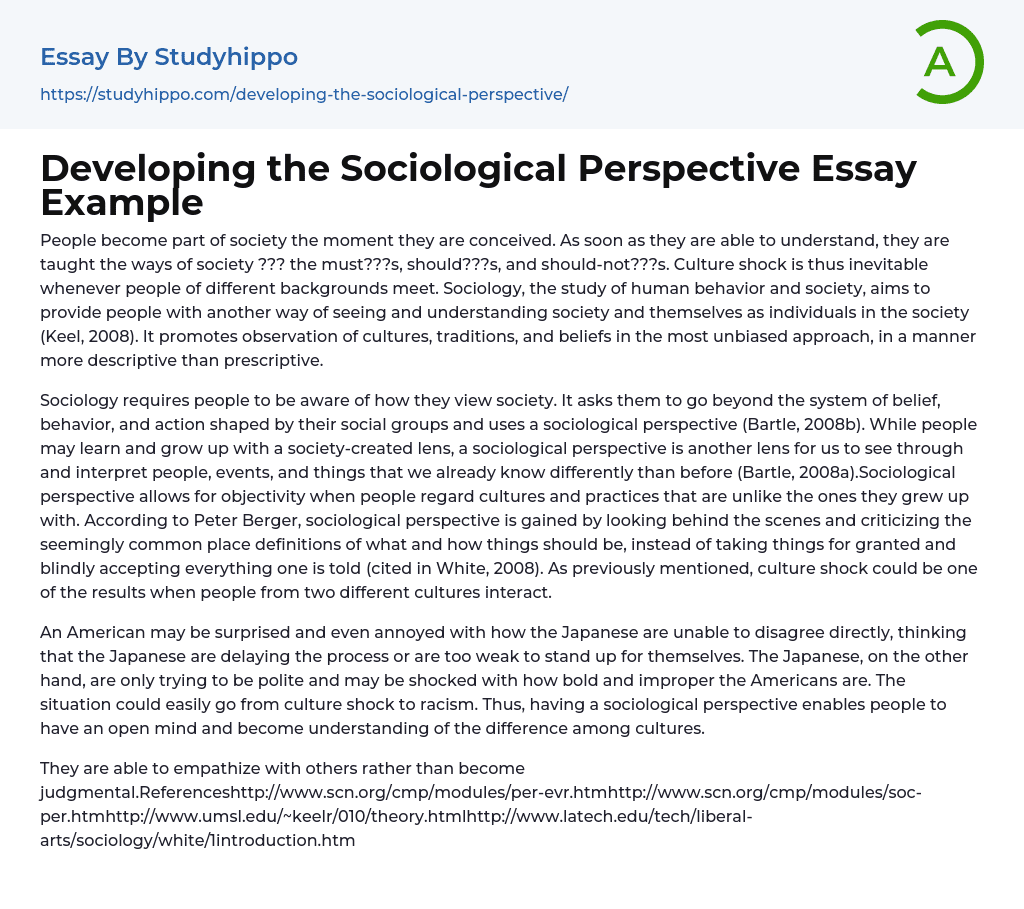People become part of society the moment they are conceived. As soon as they are able to understand, they are taught the ways of society ??? the must???s, should???s, and should-not???s. Culture shock is thus inevitable whenever people of different backgrounds meet. Sociology, the study of human behavior and society, aims to provide people with another way of seeing and understanding society and themselves as individuals in the society (Keel, 2008). It promotes observation of cultures, traditions, and beliefs in the most unbiased approach, in a manner more descriptive than prescriptive.
Sociology requires people to be aware of how they view society. It asks them to go beyond the system of belief, behavior, and action shaped by their social groups and uses a sociological perspective (Bartle, 2008b). While people may learn and grow up with a society-created l
...ens, a sociological perspective is another lens for us to see through and interpret people, events, and things that we already know differently than before (Bartle, 2008a).Sociological perspective allows for objectivity when people regard cultures and practices that are unlike the ones they grew up with. According to Peter Berger, sociological perspective is gained by looking behind the scenes and criticizing the seemingly common place definitions of what and how things should be, instead of taking things for granted and blindly accepting everything one is told (cited in White, 2008). As previously mentioned, culture shock could be one of the results when people from two different cultures interact.
An American may be surprised and even annoyed with how the Japanese are unable to disagree directly, thinking that the Japanese are delaying the process or are too
weak to stand up for themselves. The Japanese, on the other hand, are only trying to be polite and may be shocked with how bold and improper the Americans are. The situation could easily go from culture shock to racism. Thus, having a sociological perspective enables people to have an open mind and become understanding of the difference among cultures.
They are able to empathize with others rather than become judgmental.Referenceshttp://www.scn.org/cmp/modules/per-evr.htmhttp://www.scn.org/cmp/modules/soc-per.htmhttp://www.umsl.edu/~keelr/010/theory.htmlhttp://www.latech.edu/tech/liberal-arts/sociology/white/1introduction.htm
- Culture essays
- Social Control essays
- Citizenship essays
- Social Justice essays
- Caste System essays
- Social Responsibility essays
- Socialization essays
- Deviance essays
- Modern Society essays
- Popularity essays
- Civil Society essays
- Community essays
- Female essays
- Filipino People essays
- Igbo People essays
- Indigenous Australians essays
- Indigenous Peoples essays
- Minority Group essays
- Social Institution essays
- Men essays
- The nation essays
- Middle Class essays
- Social Norms essays
- Discourse Community essays
- Popular Culture essays
- Car Culture essays
- American Culture essays
- Mormon essays
- Indian Culture essays
- Mexican Culture essays
- Pop Culture essays
- Cultural Differences essays
- Culture Shock essays
- Different Cultures essays
- Adaptation essays
- Adventure essays
- Adversity essays
- Aging essays
- Alcohol essays
- Barbie Doll essays
- Beauty essays
- Care essays
- Carpe diem essays
- Change essays
- Chess essays
- Chicken essays
- Choices essays
- Contrast essays
- Crops essays
- Development essays




